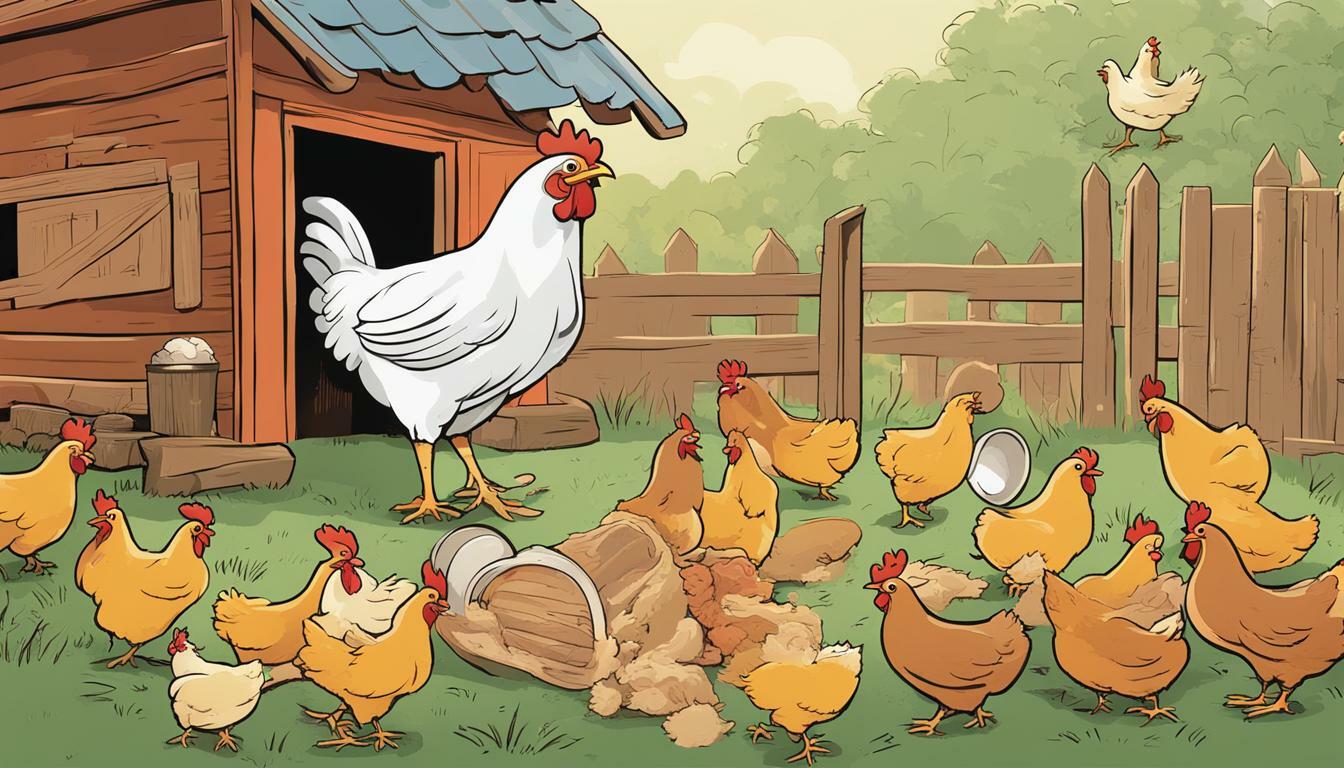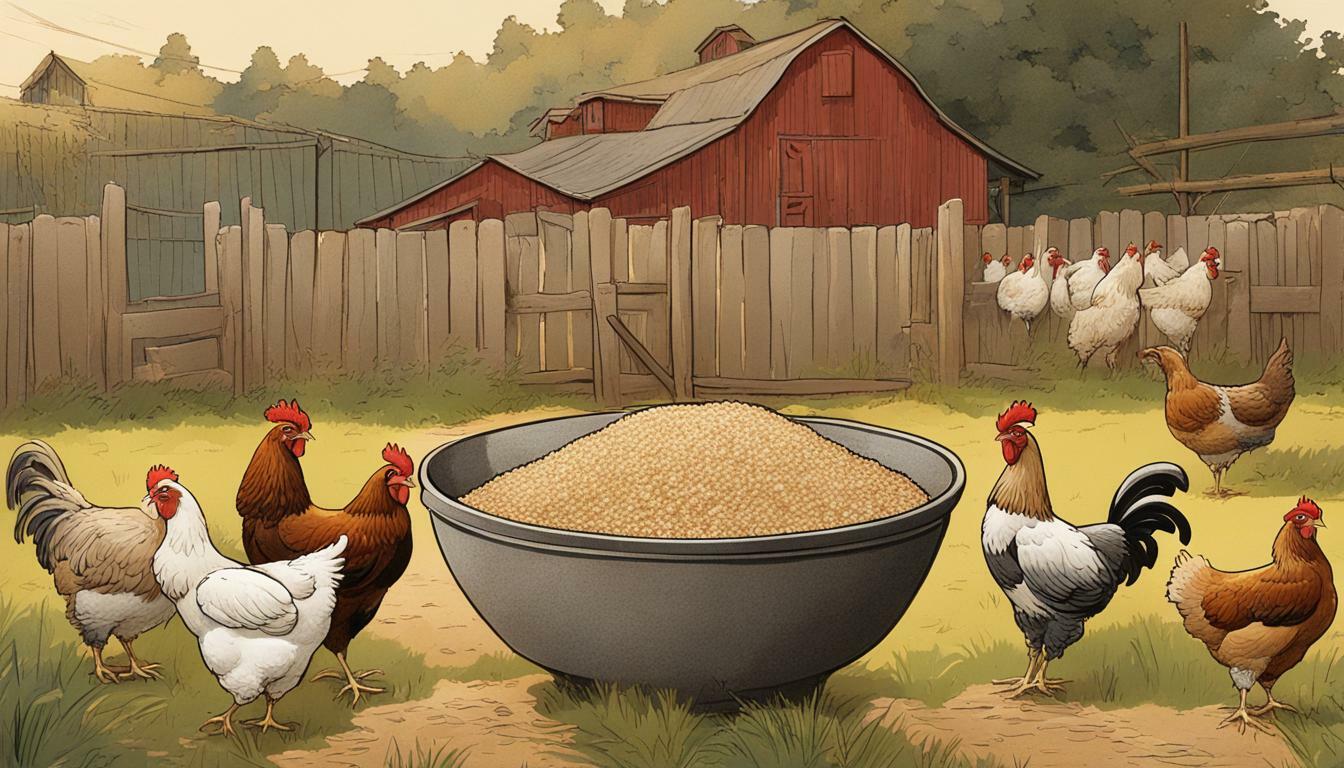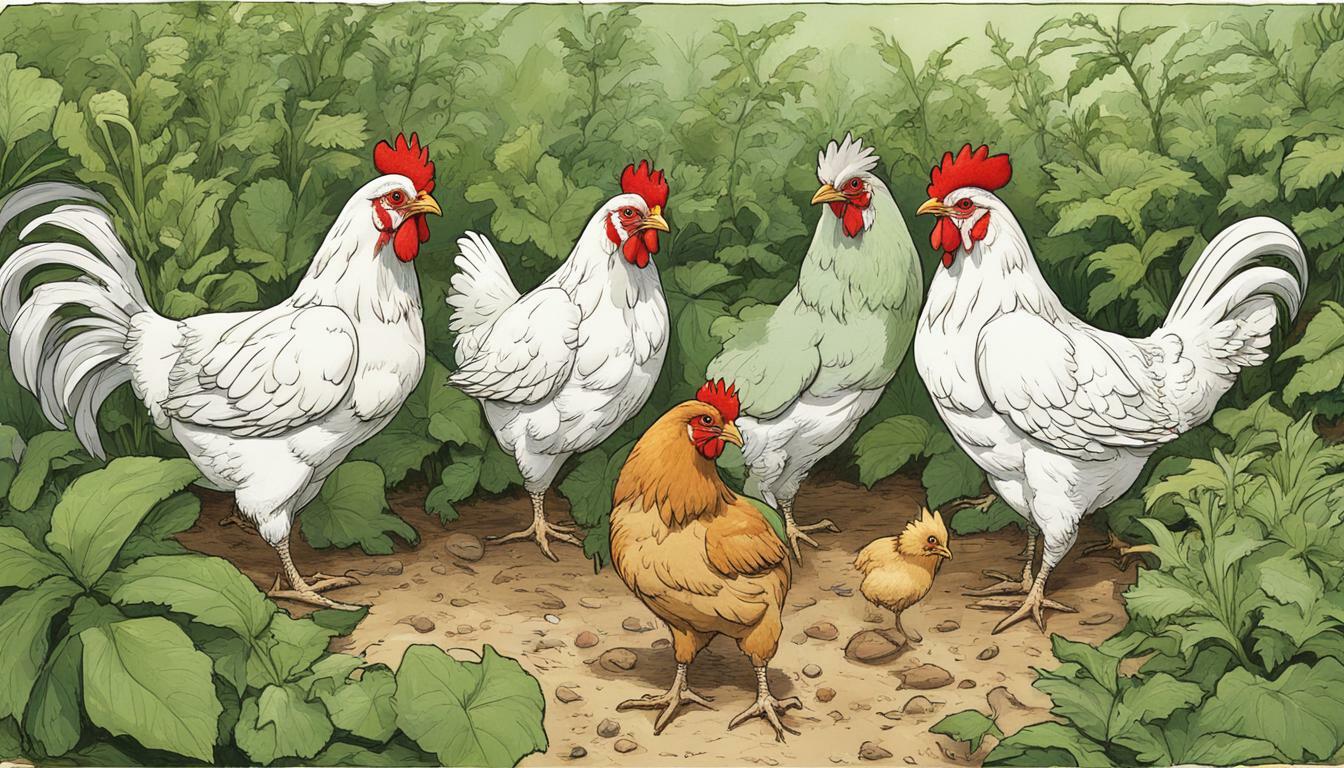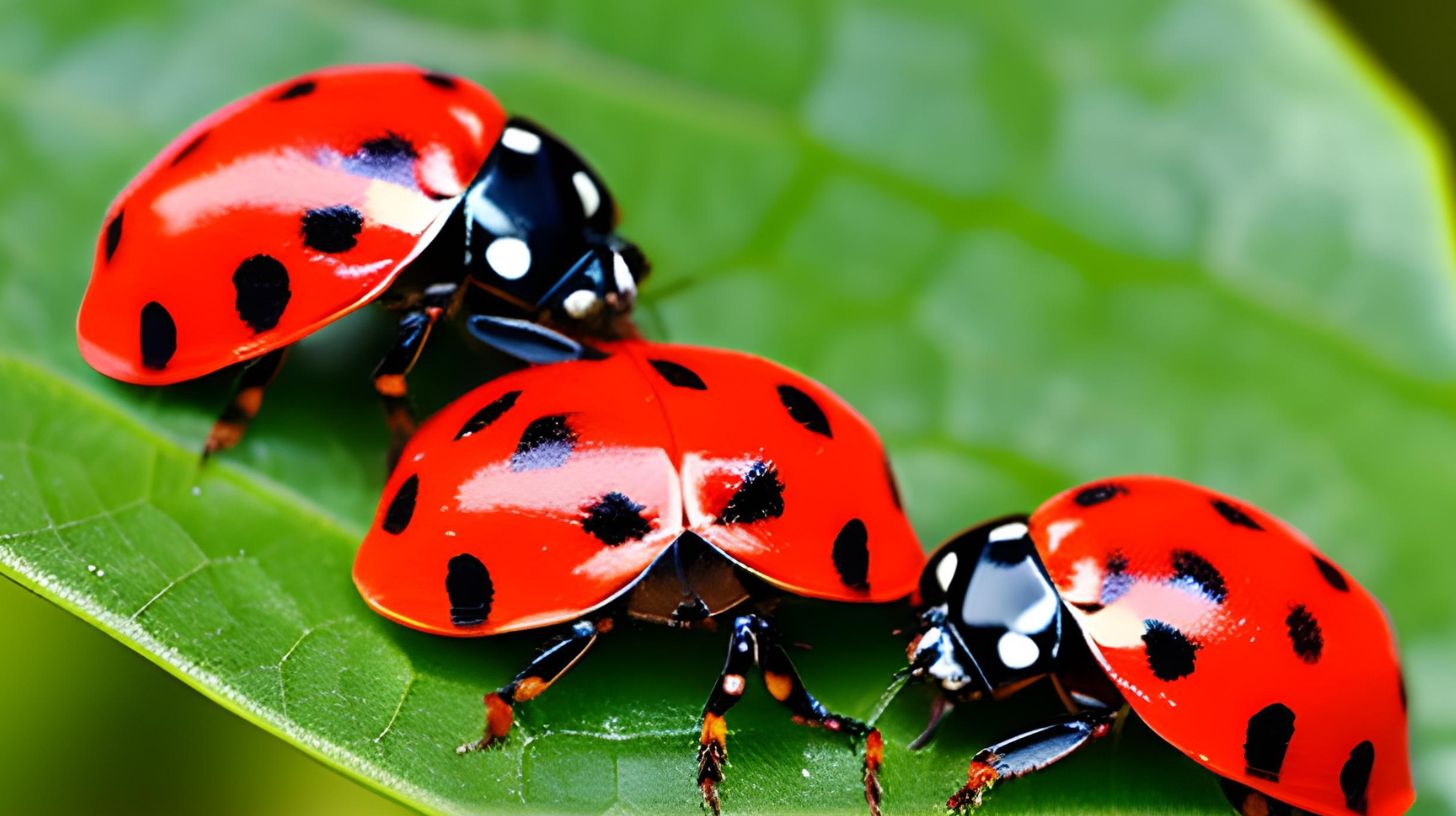Why Do Chickens Shake Their Heads? Learn Now!

Table of content:
- Common Causes of Head Shaking in Chickens
- What Do Specific Head Motions and Behaviors Mean?
- Is Frequent Head Shaking Normal?
- Causes of Abnormal Head Shaking in Chickens
- 10 Common Questions about Chicken Head Shaking
- 1. Why do chickens jerk their heads back and forth?
- 2. What does it mean when chickens shake their heads?
- 3. Do chickens shake their heads when they are hot?
- 4. Why do chickens nod their heads up and down?
- 5. Is head shaking in chickens normal?
- 6. What causes chickens to violently shake their heads?
- 7. Why does my chicken keep shaking their head from side to side?
- 8. What does it mean when a chicken shakes its head no?
- 9. Is chickens shaking their heads a sign of illness?
- 10. Do chickens shake their heads to improve vision?
- Conclusion
Chickens are known for their characteristic head shaking and jerking motions. This seemingly peculiar behavior is completely normal and serves an important purpose for chickens. In this article, we’ll explore the main reasons chickens shake their heads and what their various head movements indicate.
Common Causes of Head Shaking in Chickens
There are several reasons you may observe a chicken shaking its head frequently:
Improving Vision
Chickens have limited vision compared to humans. Their eyes are located on the sides of their heads, giving them a wide field of view but leaving them with a blind spot directly in front of their faces. Chickens shake and jerk their heads to help sharpen their visual perspective and detect predators or food sources. The rapid motions allow chickens to quickly scan their surroundings and compensate for their limited vision.
Communication and Social Order
Head shaking also allows chickens to communicate with each other. Specific head movements can signal dominance, submission, alarms, food sources and more. For example, a chicken may rapidly shake its head and neck as a display of dominance to establish its pecking order within the flock. Chickens use head shakes and motions to convey a variety of messages without making noise.
Thermoregulation
Chickens shake their heads to help cool themselves down. As chickens do not sweat, head shaking allows increased air circulation which helps lower their body temperature. On hot days, you may see chickens shaking their heads frequently to stay comfortable. The increased air flow over the moist tissues of the mouth, eyes and nostrils helps evaporate moisture for a cooling effect.
Parasite and Pest Control
Head shaking can also be a way for chickens to deter pests and control parasites. Violent head shakes can dislodge mites, lice and other external parasites that often infest chickens. The motion can also deter flying insects from landing on their faces. Chickens may shake their heads more often when bothered by pests around their eyes, ears and beak.
Natural Foraging Instinct
Head bobbing mimics the natural motions chickens make when searching the ground for seeds and insects to eat. The jerking head movements help chickens scan for potential food sources and identify edible morsels in the environment. So increased head shaking may simply indicate a chicken is eagerly foraging.
What Do Specific Head Motions and Behaviors Mean?
Chickens use their heads to communicate in a variety of subtle ways. Here are some common chicken head motions and what they can signify:
Slow Vertical Head Shakes
Bobbing their heads up and down slowly is how chickens show agreement or compliance. If you attempt to herd a chicken in a certain direction, it may give slow vertical nods to indicate it will follow. This head motion often shows they accept the authority or leadership of another chicken.
Rapid Side-to-Side Shakes
A chicken shaking its head rapidly from side to side typically indicates a negative response. It Communicates rejection, disagreement or refusal. You may see this motion from a hen refusing a rooster attempting to mate or a chick resisting a mother hen’s nudging.
Forward and Back Head Thrusts
Forceful forward and backward head motions are associated with establishing dominance. Roosters will aggressively thrust their heads toward subordinates or rivals to show their status within the pecking order. The same motion is used in mating displays.
Upward Head Shake at Feed Time
Chickens shake their heads upward when calling excitedly for food. This motion draws attention to the hungry chicken and communicates an expectation of being fed. Owners often notice chickens making this motion and bobbing toward their feed bucket.
Head Shaking When Hot
On hot days, chickens shake their heads frequently to promote air circulation for cooling themselves down. The increased motion helps bring fresh air over their mucus membranes. Watch for panting and holding wings away from their bodies along with frequent head shaking as signs of overheating.
Head Tilt Sideways
Turning their heads sideways helps chickens examine their surroundings with one eye for better focus. Tilting the head gives depth perception using monocular vision. A chicken will often tilt its head when closely inspecting something.
Is Frequent Head Shaking Normal?
Head shaking is a normal part of chicken communication and behavior. In most cases, seeing a chicken shaking its head frequently is not a cause for alarm. However, if head shaking takes on a more violent, repetitive and unnatural appearance, it may indicate a potential health issue.
Signs of Normal Head Shaking:
- Brief, sporadic motions
- Alternating side-to-side motions
- Responsive to stimuli like food, perceived threats, other chickens, etc.
- Not resulting in self-injury
Abnormal Head Shaking:
- Violent, constant, rapid shaking
- Repetitive shaking on one side more than alternating
- Unresponsive to environment
- Lasting for extended periods
- Causing self-injury and bleeding
- Accompanied by symptoms like lack of appetite, lethargy, or unresponsiveness
Causes of Abnormal Head Shaking in Chickens
While normal head shaking is harmless, abnormal and unnatural head movements can be indicative of a health problem requiring veterinary attention. Potential causes include:
External Parasites
Mites, lice and fungal infections can infest a chicken’s face, eyes, nose, mouth and ears. This can cause extreme irritation leading to violent head shaking in an attempt to dislodge the pests. Parasitic conditions often worsen over time.
Foreign Objects
Chickens explore the world with their beaks and will try eating almost anything. Debris like straw, dirt, small stones, etc. can become lodged in nasal passages and ears, causing irritation and head shaking.
Upper Respiratory Infections
Bacterial and viral respiratory illness can cause sinus congestion, irritation and inflammation. The discomfort may cause repetitive head motions along with respiratory symptoms like coughing and sneezing.
Neurological Damage
Head trauma, Toxins, poor circulation and nutritional deficiencies can damage the nervous system and cause nerve-related conditions. Damage to parts of the brain controlling head motions can lead to unnatural shaking movements.
Vestibular Disease
The vestibular system regulates balance and spatial orientation. Vestibular disease affects the inner ear and causes dizziness, instability and abnormal head motions.
Overheating
As chickens use head shaking to regulate their temperature, excessive shaking along with panting and lethargy can indicate dangerous overheating and heat exhaustion.
If your chicken is demonstrating repetitive, manic, self-injurious head shaking or shaking accompanied by other symptoms, contact an avian veterinarian immediately. Do not delay in getting appropriate treatment.
10 Common Questions about Chicken Head Shaking
Head shaking in chickens can sometimes look peculiar and concerning for owners when first noticing the behavior. Here are answers to 10 frequently asked questions:
1. Why do chickens jerk their heads back and forth?
Chickens jerk their heads sporadically to improve their vision from multiple angles. The motions allow them to quickly scan for food, threats, and environmental stimuli.
2. What does it mean when chickens shake their heads?
Head shaking can communicate several different things depending on context. Chickens may shake their heads to signal dominance, compliance, disagreement, overheating, pesky insects, excitement for food and more.
3. Do chickens shake their heads when they are hot?
Yes, chickens will noticeably shake their heads more when they are overheated. The motion circulates air over the moist tissues of their eyes, mouth and nostrils to cool themselves down since chickens do not sweat.
4. Why do chickens nod their heads up and down?
Slow, vertical head nodding indicates agreement and acceptance among chickens. If a dominant chicken directs another, the subordinate will nod slowly up and down to show compliance and avoid confrontation.
5. Is head shaking in chickens normal?
Head shaking is very normal and healthy chicken behavior. Sporadic, brief shaking motions are a core part of how chickens visually take in their surroundings and communicate.
6. What causes chickens to violently shake their heads?
Sudden, severe head shaking likely indicates a problem like parasites, respiratory infection, lodged foreign objects, neurological issues or extreme overheating. Veterinary attention is needed to determine the cause and treat abnormal head shaking.
7. Why does my chicken keep shaking their head from side to side?
Repeated motions from side to side can mean a chicken is disregarding or rejecting something. But constant, forceful motions may indicate irritation from parasites or debris lodged in the face, eyes or nasal passages.
8. What does it mean when a chicken shakes its head no?
Like humans, chickens move their heads side-to-side to signal “no” or disagreement. Young chicks may do this when resisting a mother hen’s nudging to go somewhere they don’t want to go.
9. Is chickens shaking their heads a sign of illness?
In most cases, normal sporadic head shaking is not a sign of illness. But if movements become manic, forceful and repetitive, it can indicate a health issue needs veterinary attention.
10. Do chickens shake their heads to improve vision?
Yes, chickens rapidly shake and jerk their heads frequently to sharpen their visual perspective. Chicken eyes have limited focus and missing vision directly in front. Head motions allow chickens to quickly scan the landscape and detect food, threats, flockmates and more.
Conclusion
In summary, the peculiar head shaking chickens are known for serving several important purposes. Normal head shaking allows chickens to improve their vision, communicate within social hierarchies, control body temperature, deter pests, and express interest in food. Distinct motions can signal specific meanings to other chickens.
While sporadic head shaking is perfectly healthy, abnormal movements may require veterinary attention. Contact an avian specialist immediately if chicken head shaking becomes manic, nonstop, self-injurious or accompanied by other symptoms. With an understanding of their head motions, chicken owners can better interpret this unique chicken behavior.
Welcome. I’m Adreena Shanum, the proud owner of this website, and I am incredibly passionate about animals, especially poultry. I founded adreenapets.com as a labor of love, stemming from my desire to share my knowledge and experiences with poultry enthusiasts worldwide.




